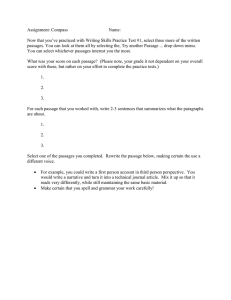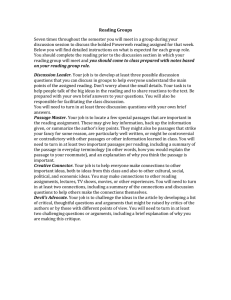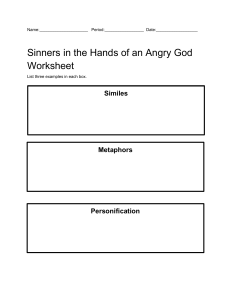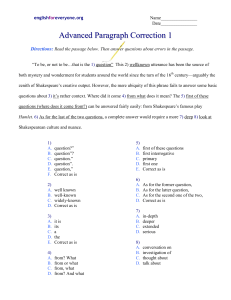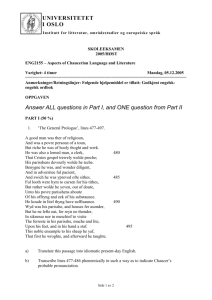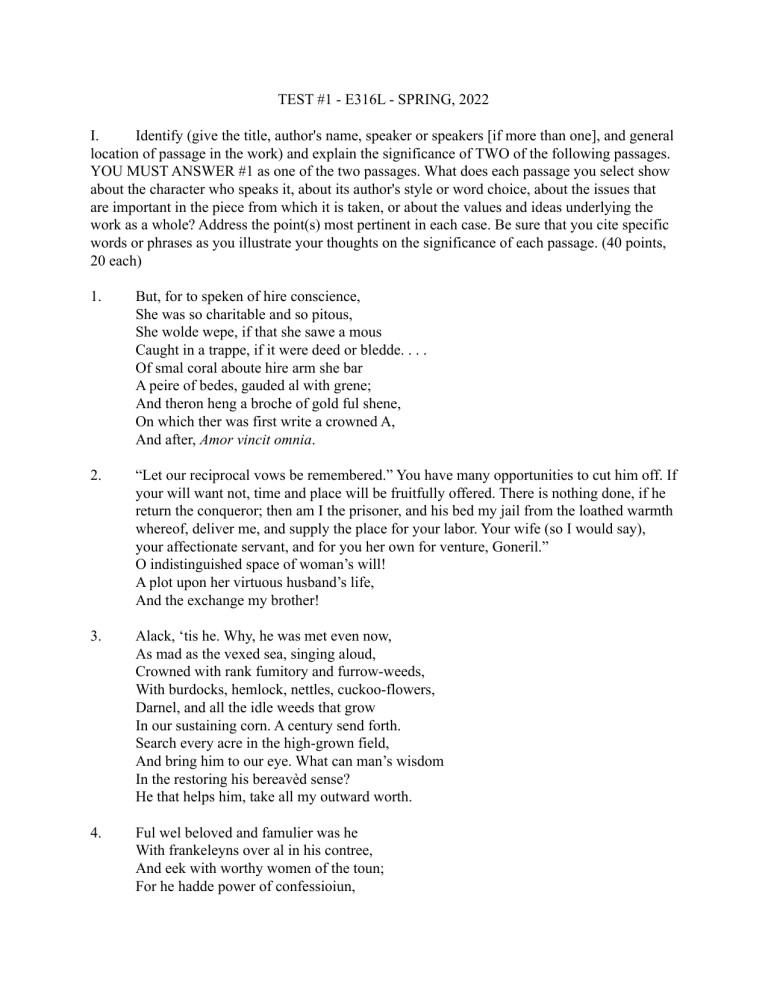
TEST #1 - E316L - SPRING, 2022 I. Identify (give the title, author's name, speaker or speakers [if more than one], and general location of passage in the work) and explain the significance of TWO of the following passages. YOU MUST ANSWER #1 as one of the two passages. What does each passage you select show about the character who speaks it, about its author's style or word choice, about the issues that are important in the piece from which it is taken, or about the values and ideas underlying the work as a whole? Address the point(s) most pertinent in each case. Be sure that you cite specific words or phrases as you illustrate your thoughts on the significance of each passage. (40 points, 20 each) 1. But, for to speken of hire conscience, She was so charitable and so pitous, She wolde wepe, if that she sawe a mous Caught in a trappe, if it were deed or bledde. . . . Of smal coral aboute hire arm she bar A peire of bedes, gauded al with grene; And theron heng a broche of gold ful shene, On which ther was first write a crowned A, And after, Amor vincit omnia. 2. “Let our reciprocal vows be remembered.” You have many opportunities to cut him off. If your will want not, time and place will be fruitfully offered. There is nothing done, if he return the conqueror; then am I the prisoner, and his bed my jail from the loathed warmth whereof, deliver me, and supply the place for your labor. Your wife (so I would say), your affectionate servant, and for you her own for venture, Goneril.” O indistinguished space of woman’s will! A plot upon her virtuous husband’s life, And the exchange my brother! 3. Alack, ‘tis he. Why, he was met even now, As mad as the vexed sea, singing aloud, Crowned with rank fumitory and furrow-weeds, With burdocks, hemlock, nettles, cuckoo-flowers, Darnel, and all the idle weeds that grow In our sustaining corn. A century send forth. Search every acre in the high-grown field, And bring him to our eye. What can man’s wisdom In the restoring his bereavèd sense? He that helps him, take all my outward worth. 4. Ful wel beloved and famulier was he With frankeleyns over al in his contree, And eek with worthy women of the toun; For he hadde power of confessioiun, As seyde himself, more than a curat, For of his ordre he was licentiate. . . . He was an esy man to yeve penaunce Ther as he wiste to have a good pitaunce. For unto a povre ordre for to yive Is signe that a man is wel y-shrive-For if he yaf, he dorste made avaunt, He wiste that a man was repentaunt. II. One of the following passages is NOT from either of the texts you have read by Chaucer or Shakespeare. Which passage is it? To get full credit for your answer, explain what the fake passage looks like it is, and how, specifically, you can tell that it is not that. What aspects of the passage (for example, its content, form, or word choice) lead you to conclude that it is fake? (20 points) 1. Was this a face To be opposed against the warring winds? To stand against the deep dread-bolted thunder? In the most terrible and nimble stroke Of quick cross lightning? To watch, poor perdu, With this thin helm? Mine enemy’s dog, Though he had bit me, should have stood that night Against my fire. And wast thou fain, poor father, To hovel thee with swine and rogues forlorn In short and musty straw? 2. Benigne he was, and wonder diligent, And in adversitee ful pacient And swich he was y-preved ofte sythes. Full looth were him to cursen for his tithes, But rather wolde he yeven, out of doute, Unto his povre parisshens about Of his offring, and eek of his substaunce. 3. Here, take this purse, you whom the heavens’ plagues Have humbled to all strokes. That I am wretched Makes thee the happier. Heavens deal so still. Let the superfluous and lust-dieted man That slaves your ordinance, that will not see Because he does not feel, feel your power quickly. So distribution should undo excess, And each man have enough. Dost thou know Dover? 4. His felaw taught him homeward prively, Fro day to day, til he coude it by rote, And thanne he song it wel and boldely Fro word to word, acording with the note; Twyes a day it passed thurgh his throte, To scoleward and homeward when he wente. On Cristes moder set was his entente. 5. Yet better thus, and known to be condemned, Than still condemned and flattered. To be worst, The lowest and most dejected thing of fortune, Stands still in Esperance, lives not in fear. The lamentable change is from the best; The worst returns to laughter. Welcome, then, Thou insubstantial air that I embrace: The wretch that thou hast blown unto the worst Owes nothing to thy blasts. 6. My noble Lear, and Lord of Burgundy, I hereby take Cordelia for my own. Whate’er her sin, I’ll draw a veil upon’t: I care not what it is. Her character Concerns me less than your prospective love. That love, encompassed well with land, may quicken hence, And your affections grow from present dearth. Your natural feelings for this daughter, Lear, May come again, and with it her large dower, Well worth the wait and patience with her crimes. She can be what she is; your mood will change. III. Write a brief essay on the following question. (40 points) Both Chaucer and Shakespeare see charity as a generalized love of humanity that includes the guilty or imperfect as well as the good. Lear’s Cordelia and Chaucer’s Parson are both characters who possess charity in this sense, although they exhibit this charity in different ways and under different circumstances. In fact, one might say that Shakespeare’s ideal of charity differs from Chaucer’s in crucial ways. Write a brief essay in which you defend this thesis, using passages from Shakespeare’s and Chaucer’s texts to illustrate and support your argument. You must cite from at least two passages in Parts I or II, above, in writing your answer, although you may also use passages not in Parts I or II if you wish.
